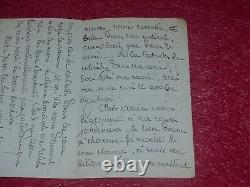
- Homepage
- Author
- Alfred Bruneau (3)
- Anatole France (3)
- Auguste Maquet (3)
- Beydts (louis) (4)
- Camille Mauclair (3)
- Charles Monselet (3)
- Chateaubriand (5)
- Ernest Daudet (3)
- Henri Barbusse (3)
- Jean Couty (3)
- Jean-léon Gérôme (5)
- Louise Read (4)
- Marcel Proust (5)
- Paul Chabas (4)
- Paul Meurice (3)
- Proust (3)
- Roger Martin Du Gard (4)
- Salomon Reinach (3)
- Sully Prudhomme (7)
- Violette Leduc (4)
- Other (3997)
- Binding
- Era
- 18th Century (11)
- 1900 To 1960 (60)
- 1930s (4)
- 1960s (5)
- 1970s (7)
- 19th (5)
- 19th Century (48)
- 20th Century (15)
- Beautiful Era (12)
- Belle Epoque (49)
- First Empire (8)
- Nineteenth (19)
- Nineteenth Century (11)
- Post-war (21)
- Restoration (17)
- Revolution (4)
- Roaring Twenties (28)
- Second Empire (21)
- Second World War (5)
- World War Ii (9)
- Other (3713)
- Language
- Theme
- Type
COLL HENRY DAVRAY SIGNED AUTOGRAPH LETTER STUART MERRILL (American Poet) 1901









Coming from the old archives or personal collections of Henry D. There are many letters for sale individually, particularly from Stuart MERRILL, but also from other French or English-speaking writers of the time, publishers, literary magazine editors, etc... An autographed letter signed by Stuart MERRILL.
Undated (but from July 1901). 1 sheet of bluish paper folded in the center forming 4 pages.4 handwritten pages and 1 loose sheet of bluish paper. Very good overall condition, clean.
Usual folds, various minor stains on edges or verso. Concerning the literary and artistic life of the late 19th and early 20th centuries. By his real name Henry Durand, he is also known under the pen names of Henry Davray, an eminent popularizer of English literature in the early 20th century, translating and introducing the works of Oscar Wilde, Rudyard Kipling, Frank Harris, H. Wells, Joseph Conrad, and George Meredith. He created several magazines, the most well-known being the Anglo-French Review.After World War I, his efforts to promote English prose made him the most famous Frenchman in British literary circles, where he settled in 1940 after being made a Commander of the Order of the British Empire by King George VI. From 1896, Davray was responsible for the "English Letters" section of the Mercure de France. The first translator of De Profondis and The Ballad of Reading Gaol by Oscar Wilde in 1898, he also translated into French a large part of H.
's works from 1898 to 1912 (including the famous The War of the Worlds). Literary critic, journalist, translator, writer. Henry Durand-Davray, born on August 14, 1873, in Gennevilliers, and died on January 21, 1944, in London, was a French translator and literary critic. A specialist in English literature at the prestigious Parisian newspaper Mercure de France, he translated the works of H. Wells, Rudyard Kipling, Oscar Wilde, and Yeats into French. During World War I, he served as a war correspondent and official delegate of the French government. He was the brother-in-law of painter Georges Dola. Born to a father from Vosges, Jean-Lucien-Henry Durand, a gardener, and an Occitan mother, a chambermaid and then a cook, he developed a deep aversion to Germany and an attraction to England, where he spent most of his vacations. He began studying English at the Sorbonne but was unable to obtain a degree due to prolonged absences. Nevertheless, he acquired a vast culture that allowed him to integrate and evolve in artistic, political, and literary circles in both London and Paris.He met many writers, including those belonging to H. Wells's circle: Arnold Bennett and Joseph Conrad.
In 1917, he was one of the founders of the Anglo-French Society, whose aim was to promote the Entente Cordiale: his friends affectionately nicknamed him "the tunnel under the Channel." When Oscar Wilde was released from prison in 1897 and stayed for a while in Naples, Henry D. Davray met him after obtaining his address, Villa Giudice at Pausilippe, through Ernest Dowson, a close friend of the writer.
The two men met again by chance when, towards the end of his life, Oscar Wilde was in need. After having to cancel an appointment to receive him, Wilde asked Davray for money and offered him in exchange a signed copy of The Duchess of Malfi by John Webster. A symbolist and anarchist poet, American nationality, Stuart Merrill spent his childhood in Paris, where his father worked at the United States embassy. At the Lycée Condorcet, he was a classmate of some future symbolists, including René Ghil, André Fontainas, and Éphraïm Mikhaël, among others.The French language captivated him, and he acquired a very rich poetic culture. There, he became the spokesperson for French poetry, particularly the Parnassians, from whom he was strongly influenced.
At the same time, he familiarized himself with the prosody of the English language. He published his first collection of verses, Les Gammes (1887), at a time when a circle around Mallarmé was forming. The reference to music is evident, and like most other symbolists, he sought to use words as notes on a staff, as elementary sounds that would organize themselves into a song. While others, like Ghil, found novel methods, such as verbal instrumentation, to achieve this musicality, Stuart Merrill borrowed the technique of alliteration from Anglo-Saxon poetry; he applied it systematically and quickly revealed the limits of such a poetics.
Fastes (1891), Petits Poèmes d'automne (1895) still bear the mark of this prosodic work; however, Stuart Merrill gradually freed himself from all influence: Les Quatre Saisons (1900) is a much more personal and original evocation. Definitely settled in France since 1890, Merrill wrote numerous articles on the symbolists, contributing to their appreciation by the public on both sides of the Atlantic.
However, as a great admirer of American poet Walt Whitman, he evolved towards a much more didactic poetry. A Voice in the Crowd (1909) illustrates his love for humanity and his democratic ideal. Language serves his conviction, and he gains a strength foreign to his earlier verses. The manifesto of symbolism, published by Jean Moréas on September 18, 1886, appears while Stuart Merrill is in the United States, which he had returned to after the death of his father.
It is from there that he corresponds with his French friends and sends his first poems for publication. "Passionate about social justice, involved in the Marxist movement, he was seen selling leaflets in the streets of New York denouncing the 'four hundred' of high society... Having returned definitively to France, at the height of symbolism, he published Les Fastes in 1891 and Les Petits Poèmes d'automne in 1895, opened a salon frequented by symbolists at his home on Quai de Bourbon in Paris, supported Oscar Wilde during his trial, and was enthusiastic about the Armenian cause and the defense of Captain Dreyfus. A contributor to the magazines La Plume and L'Ermitage, he linked his poetic writing to a political commitment marked by anarchism.
"What gives strength to the symbolist theory is precisely its anarchy. It asks the poet only to be significant, that is, individual, and to reveal himself, thought and emotion, through images as general as possible. Yes, symbolism is anarchism in literature; instead of curling up between two dates, like Mr. Zola, or stuffing himself alive into a mummification box, like Mr.
Leconte de Lisle, it roams its glorious fantasy through lands and ages, and cares little whether the riches it gathers come from Golconda or Ophir." L'Ermitage, August 1893, p.
It is thus understandable his attachment to free verse and vers libre, freed from the constraints of metrics. However, beyond structure, it is indeed inspiration that lies at the heart of his poetic approach: "The talent of the poet alone justifies or condemns his metric.
